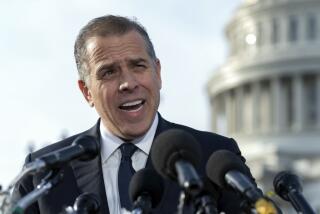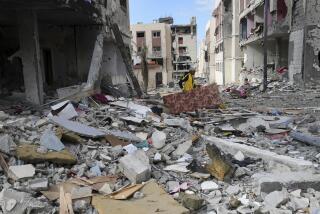ABC News Draws Criticism of Spy Case Re-Creation
- Share via
ABC News’ use last Friday of a staged re-enactment of an alleged spy scandal incident without labeling the faked photographs a simulation drew strong reactions from major news organizations Tuesday. Meanwhile, ABC network officials continued to insist that “World News Tonight” producers simply made a “terrible mistake” in failing to properly label the dramatization.
Though the network seemed to violate two of its own rules on the use of re-created events during its news programs, Richard Wald, senior vice president of network news, defended the use of staged re-enactions as nothing more than extensions of courtroom sketches.
Last Friday, during an exclusive news report on American diplomat Felix S. Bloch’s alleged spying activities for the Soviet KGB, ABC aired two grainy, realistic-looking still photographs of a balding man (Bloch is balding) handing over a briefcase to another man, while ABC correspondent John McWethy narrated: “It was not until earlier this year that Bloch was videotaped handing over a briefcase to a known Soviet agent on the streets of a European capital.”
Though viewers might have easily thought that these were actual photographs of Bloch giving material to a Soviet agent, they were in fact staged photographs whipped together by ABC news producers. Wald said that ABC producers had not seen the FBI videotape of Bloch’s alleged encounter with the KGB on which these photographs were based, but that they took it as a given that one briefcase transaction looked like any other.
During the first feed of “World News Tonight,” which ABC officials said was carried by most of its affiliates nationwide Friday, these photos aired without being labeled a simulation. A subsequent transmission of the Peter Jennings-anchored newscast corrected the mistake.
A Cable News Network news executive said that CNN never dramatizes any news event and criticized ABC for what he called “theater-in-the-round” in the middle of their newscast.
“There is enough real drama in the news that I don’t think additional theatrical techniques are really necessary,” said Ed Turner, CNN’s executive vice president, news gathering. “That’s what a reporter is for and what good writing is all about. There is already so much blending of the ‘docu’ and ‘drama’ and the blurring of the lines between news and entertainment, that I fear increased use of this practice is dangerous.”
Turner also dismissed the comparison to the longstanding TV news technique of using courtroom sketches by pointing out that a courtroom artist is on the scene drawing pictures of real people and a real event, while re-enactments, such as the one ABC aired last week, use actors.
“Where does it stop?” Turner continued. “The idea of having actors playing roles, even with all the supers (super-titles) and labels in the world saying ‘re-enactment, dramatization, this ain’t for real, gang,’ is somehow offensive to what we are telling you is real.”
NBC News President Michael Gartner said through a spokeswoman Tuesday that he would not have permited “NBC’s Nightly News” to employ a simulation such as the one ABC aired Friday.
“I cannot conceive of an example where we would use re-creations or simulations,” Gartner said. “ ‘Nightly News’ is not the proper forum for such re-creations, and the practice would be confusing and diverting.”
NBC’s official policy on re-enactment in its newscasts states that “staging of any kind is prohibited,” and that any re-enactments must be clearly labeled and not give any “erroneous impression” of actual events. Re-enactments also must “facilitate the understanding of what happened,” such as a breaking down of the events leading to the Challenger space shuttle disaster, for example, an NBC spokeswoman said.
Barry Chase, vice president for programming for PBS, agreed that if ABC failed to label the photographs as a simulation, “it wouldn’t be doing anything, but a public disservice.” He immediately cautioned, however, that PBS news programs sometimes employ re-creations of news events as long as news producers are careful to label them as such. He said ABC’s failure to label these photographs must have been a simple human oversight.
CBS, which like ABC and PBS permits dramatizations on its newscasts, said through a spokesman Tuesday that its policy on re-creations, which is essentially the same as the other networks, states “that it may be necessary to recreate an event for subsequent broadcast. And in each situation, the fact that a re-creation is being broadcast must be made specifically clear to the viewer, and it must be a faithful reproduction of the original event.”
More to Read
The biggest entertainment stories
Get our big stories about Hollywood, film, television, music, arts, culture and more right in your inbox as soon as they publish.
You may occasionally receive promotional content from the Los Angeles Times.










